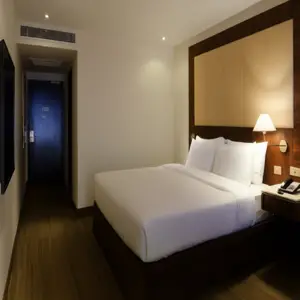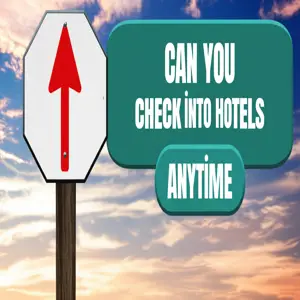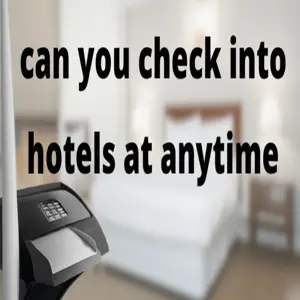The allure of a comfortable hotel room after a long journey is undeniable. But what happens when your travel plans don’t perfectly align with standard check-in times? Can you waltz into a hotel at any hour and expect to be handed a key? The answer, as with many things, is nuanced.
In this comprehensive guide, we’ll explore the realities of hotel check-in policies in 2024, covering everything from early check-in requests to guaranteed reservations and the factors that influence a hotel’s ability to accommodate your needs. This article will provide the most up-to-date information, including current trends, statistics, and regulations, empowering you to plan your travels with confidence and avoid unexpected surprises.
Table of Contents
Understanding Standard Hotel Check-In Times
Before diving into the possibilities of checking in at unconventional hours, it’s crucial to understand the typical check-in and check-out times that most hotels adhere to. These times are not arbitrary; they are carefully calculated to allow hotel staff sufficient time to prepare rooms for incoming guests.
Typical Check-In and Check-Out Windows
The most common check-in time for hotels worldwide falls between 3:00 PM and 4:00 PM. Check-out time is usually between 11:00 AM and 12:00 PM. These timeframes provide a buffer for housekeeping staff to clean, sanitize, and restock rooms after a guest departs and before the next one arrives.
Here’s a table summarizing the typical check-in and check-out times:
| Activity | Typical Time |
|---|---|
| Check-In | 3:00 PM – 4:00 PM |
| Check-Out | 11:00 AM – 12:00 PM |
Why These Times Are Standard
These standard times are based on operational efficiency. Consider the logistics involved:

hotel check-in policy
- Housekeeping: Thoroughly cleaning a room, including changing linens, sanitizing surfaces, and restocking amenities, takes time – typically between 30 minutes and an hour per room, depending on the size and condition.
- Maintenance: The period between check-out and check-in allows for necessary maintenance tasks, such as fixing minor repairs or addressing guest requests.
- Staffing: Hotels schedule staffing levels based on anticipated arrival and departure patterns. Having a defined window allows for efficient allocation of resources.
The Possibility of Early Check-In
Now, let’s address the burning question: can you check in before the designated check-in time? The answer is a conditional “maybe.” Several factors influence a hotel’s ability to accommodate early arrivals.
Factors Influencing Early Check-In Availability
The availability of early check-in depends on several variables:
Hotel Occupancy: This is the most significant factor. If the hotel is fully booked the night before, there will be little to no flexibility for early check-ins, as all rooms will be occupied until the standard check-out time.
Room Availability: Even if the hotel isn’t fully booked, the specific room type you’ve reserved might not be available early. The previous occupant may have checked out late, or the room might require extra cleaning or maintenance.
Hotel Policies: Some hotels have stricter policies regarding early check-in than others. Luxury hotels or boutique hotels might be more accommodating due to their emphasis on personalized service, while budget hotels might be less flexible due to limited staffing and resources.
Loyalty Program Status: Being a member of a hotel’s loyalty program, especially at a higher tier, can often grant you privileges such as priority check-in or guaranteed early check-in (subject to availability).
Time of Arrival: Arriving only an hour or two before the standard check-in time is more likely to be accommodated than arriving several hours early.
Day of the Week: Hotels are typically busier during weekends and holidays, making early check-in less likely during these peak periods.
Strategies for Securing Early Check-In
While early check-in isn’t guaranteed, there are several strategies you can employ to increase your chances:
Call Ahead: Contact the hotel directly, preferably a day or two before your arrival, and inquire about the possibility of early check-in. Be polite and explain your situation (e.g., arriving on an early flight). This is arguably the most effective method.
Utilize Hotel Apps: Many hotels have mobile apps that allow you to request early check-in. These apps often streamline the process and provide real-time updates on room availability.
Join Loyalty Programs: As mentioned earlier, loyalty programs often offer early check-in as a perk for higher-tier members.
Book Directly: Booking directly with the hotel (rather than through a third-party website) may give you more leverage when requesting early check-in. Hotels often prioritize guests who book directly.
Consider Paying for Early Check-In: Some hotels offer a guaranteed early check-in option for an additional fee. This is a worthwhile investment if early arrival is crucial.
Be Polite and Patient: A friendly and understanding attitude can go a long way. Hotel staff are more likely to assist guests who are courteous and patient.
Arrive Prepared to Wait: If your room isn’t ready upon arrival, be prepared to wait comfortably in the lobby. Some hotels may offer you complimentary drinks or snacks while you wait.
Request Specific Room Locations or Types in Advance: If you have a strong preference for a particular room location or type, make sure to request it well in advance. This gives the hotel more time to prepare your preferred room, potentially increasing your chances of early check-in.
Real-World Examples
Scenario 1: A business traveler arriving at 1:00 PM for a 4:00 PM check-in at a moderately booked hotel. Calling ahead and explaining the need to prepare for a meeting often results in early check-in, especially with loyalty program status.
Scenario 2: A family arriving at 10:00 AM after a long overnight flight at a fully booked resort. Early check-in is unlikely, but the hotel may offer access to the pool and luggage storage while they wait. They might also be offered the option to pay for an immediate room upgrade if one is available.
Scenario 3: A solo traveler arriving at 2:00 PM at a boutique hotel with low occupancy. The hotel, known for its personalized service, likely grants early check-in without hesitation.
The Reality of Late Check-In
What about the opposite scenario? What if you’re arriving significantly later than the standard check-in time? Can you check in at any hour, even in the middle of the night?
Guaranteed Reservations and Late Arrival Policies
The key concept here is a “guaranteed reservation.” A guaranteed reservation ensures that the hotel holds your room, regardless of your arrival time. However, it’s crucial to understand the hotel’s specific policies regarding late arrivals.
Credit Card Guarantee: Most reservations are guaranteed with a credit card. This means that the hotel can charge your card if you fail to show up (a “no-show”) or if you cancel your reservation outside the cancellation window.
Hotel Notification: It is imperative to inform the hotel if you anticipate a late arrival, especially if you’re arriving after midnight. This prevents them from assuming you’re a no-show and releasing your room. A simple phone call or email to the hotel is sufficient.
24-Hour Front Desk: Hotels with a 24-hour front desk can typically accommodate late check-ins without issue, provided you’ve guaranteed your reservation and notified them of your late arrival.
Small Hotels or Guesthouses: Smaller establishments, particularly those without a 24-hour front desk, may have more restrictive late check-in policies. They might require you to make special arrangements in advance or provide a contact number for after-hours assistance.
No-Show Policies: Failing to notify the hotel of a late arrival can result in your reservation being canceled and your room being released. You may also be charged a no-show fee, which is typically equivalent to one night’s stay.
Steps to Ensure a Smooth Late Check-In
To avoid any complications with late check-ins, follow these steps:
1. Guarantee Your Reservation: Always guarantee your reservation with a credit card.
2. Notify the Hotel: Inform the hotel of your anticipated late arrival, preferably at least 24 hours in advance. Provide an estimated time of arrival.
3. Confirm Late Arrival Policy: Clarify the hotel’s late arrival policy, including whether they have a 24-hour front desk and any procedures for after-hours check-in.
4. Keep the Hotel Updated: If your travel plans change and you anticipate arriving even later, update the hotel as soon as possible.
5. Have Your Confirmation Details Ready: Upon arrival, have your confirmation number and identification readily available.
Example Scenario
Imagine your flight is delayed, and you won’t arrive at your hotel until 3:00 AM. You booked the room with your credit card and immediately call the hotel to inform them of the delay. The hotel, which has a 24-hour front desk, assures you that your room will be held, and they will be expecting you. Upon arrival, you present your ID and confirmation number and check in without any issues. This is how late check-in is supposed to work.
Hotel Policies and Their Impact
Hotel policies play a significant role in determining whether early or late check-in is possible. These policies vary widely between hotel chains and individual properties.
Chain Hotel vs. Independent Hotel Policies
Chain Hotels: Large hotel chains often have standardized policies regarding check-in and check-out, which are usually outlined on their website or in their booking terms and conditions. These policies are generally consistent across all properties within the chain. Furthermore, loyalty programs associated with chain hotels can give you additional perks.
Independent Hotels: Independent hotels have more flexibility in setting their own policies. They may be more willing to accommodate individual requests, but their policies can also be less transparent. It’s crucial to contact independent hotels directly to inquire about their check-in policies.
The Role of Hotel Management Systems (HMS)
Hotel Management Systems (HMS) are software platforms that hotels use to manage reservations, room inventory, and guest information. These systems play a crucial role in determining check-in availability.
Real-Time Availability: HMS provides hotel staff with real-time information on room availability, allowing them to quickly assess whether an early check-in is possible.
Automated Communication: Some HMS systems can automatically send pre-arrival emails or text messages to guests, reminding them of the standard check-in time and providing an opportunity to request early check-in.
Efficient Room Assignment: HMS helps hotel staff efficiently assign rooms based on guest preferences and availability, streamlining the check-in process.
Data Analysis: HMS systems can also generate reports on check-in patterns and guest requests, helping hotels optimize their staffing levels and improve their overall service.
Seasonal Variations and Special Events
Peak Season: During peak travel seasons (e.g., summer holidays, school breaks), hotels are typically at or near full occupancy, making early check-in extremely difficult. Late check-in may also be less flexible, as the hotel needs to prepare rooms for incoming guests.
Low Season: During the off-season, hotels often have lower occupancy rates, increasing the likelihood of early check-in and providing more flexibility with late check-out.
Special Events: Large-scale events, such as conferences, festivals, or sporting events, can significantly impact hotel occupancy. During these events, early check-in is typically not possible, and late check-in may be subject to strict policies.
Technology and Check-In Flexibility
Technology is transforming the hotel industry, offering new ways to enhance check-in flexibility and improve the guest experience.
Mobile Check-In and Keyless Entry
Mobile Check-In: Many hotel chains offer mobile check-in through their mobile apps. This allows guests to check in remotely, select their room, and receive a digital key on their smartphone. Mobile check-in can significantly reduce wait times and provide more flexibility in terms of arrival time.
Keyless Entry: Keyless entry systems allow guests to unlock their room using their smartphone or a unique code. This eliminates the need to visit the front desk, providing even greater flexibility for late arrivals.
Self-Service Kiosks
Self-service kiosks are becoming increasingly common in hotels, particularly in larger properties. These kiosks allow guests to check in, print their room key, and access other services without interacting with hotel staff.
24/7 Availability: Self-service kiosks are available 24/7, providing a convenient option for late arrivals or guests who prefer a contactless check-in experience.
Reduced Wait Times: Kiosks can help reduce wait times at the front desk, especially during peak check-in hours.
Multilingual Support: Many kiosks offer multilingual support, making them accessible to a wider range of guests.
The Future of Check-In: Biometrics and AI
The future of hotel check-in is likely to involve even more advanced technologies, such as biometrics and artificial intelligence (AI).
Biometric Check-In: Biometric technologies, such as facial recognition or fingerprint scanning, could be used to verify guest identity and streamline the check-in process.
AI-Powered Concierge: AI-powered virtual assistants could provide guests with personalized recommendations, answer questions, and handle check-in and check-out requests.
Predictive Room Allocation: AI algorithms could analyze historical data to predict room availability and optimize room allocation, increasing the likelihood of early check-in.
Potential Problems and How to Avoid Them
Despite the best planning, unexpected problems can arise during check-in. Here’s how to anticipate and address them.
Overbooked Hotels
The Scenario: Hotels sometimes overbook their rooms, meaning they sell more rooms than they have available. This can happen due to errors in reservation systems, unexpected cancellations, or other unforeseen circumstances.
Your Rights: If you arrive at a hotel with a guaranteed reservation and find that the hotel is overbooked, you are entitled to “walked” to another hotel of equal or better quality at the original hotel’s expense. This includes transportation to the new hotel and compensation for any inconvenience.
How to Avoid: While you can’t completely prevent overbooking, you can reduce your risk by booking directly with the hotel, confirming your reservation a few days before arrival, and arriving as early as possible.
Example: You arrive at your hotel at 6:00 PM to find they are overbooked. You booked directly and have your confirmation. The hotel should arrange and pay for your stay at a comparable nearby hotel. They might also offer additional compensation like a free meal or future discount.
Room Not Ready
The Scenario: Even if you arrive during the designated check-in time, your room may not be ready due to late check-outs, cleaning delays, or maintenance issues.
What to Do: Politely inquire about the estimated time of readiness. Ask if you can store your luggage and use the hotel facilities (e.g., pool, gym) while you wait. If the delay is significant, request compensation, such as a discount on your room rate or a complimentary upgrade.
Prevention: Call ahead on the day of arrival to confirm your room is ready.
Incorrect Room Type
The Scenario: You arrive to find that you’ve been assigned a room type different from what you booked (e.g., a room with two beds instead of a king bed).
Resolution: Immediately notify the front desk. They should either assign you the correct room type or offer a comparable alternative. If neither is available, negotiate compensation for the inconvenience.
Hidden Fees
The Scenario: You’re surprised by unexpected fees upon check-in or check-out, such as resort fees, parking fees, or internet charges.
Protection: Carefully review the hotel’s policies regarding fees before booking. Inquire about any potential hidden fees at check-in. If you believe a fee is unjustified, dispute it with the hotel management.
Transparency is Key: Hotels should be transparent about all fees. If you find undisclosed charges, contest them immediately and, if necessary, report the hotel to consumer protection agencies.
Travel Trends and Hotel Check-In
Current travel trends are impacting hotel check-in procedures, leading to more flexible and personalized experiences.
Bleisure Travel
“Bleisure” travel, a combination of business and leisure, is on the rise. Bleisure travelers often arrive at hotels at unconventional times due to work commitments or extended stays. Hotels are adapting by offering more flexible check-in and check-out options, as well as amenities that cater to both business and leisure needs.
Digital Nomadism
The increasing popularity of digital nomadism has led to a demand for hotels with flexible check-in policies and reliable Wi-Fi. Digital nomads often work remotely from their hotel rooms and may require early check-in or late check-out to accommodate their work schedules.
Sustainable Travel
Sustainable travel is becoming increasingly important to travelers. Hotels are responding by implementing eco-friendly practices, such as reducing waste, conserving energy, and offering sustainable amenities. Some hotels are also offering incentives for guests who arrive by public transportation or who opt out of daily housekeeping services, which can indirectly influence check-in and check-out procedures. For example, offering priority early check-in to guests who arrive by train.
Statistics and Data
Let’s look at some statistics that shed light on hotel check-in trends:

flexible arrival time
Early Check-In Requests: According to a 2023 survey by a major hotel booking platform, approximately 30% of hotel guests request early check-in.
Mobile Check-In Adoption: A 2024 report by Hospitality Technology found that over 60% of hotels offer mobile check-in, and adoption rates among guests are steadily increasing.
Guest Satisfaction: Studies have shown that flexible check-in and check-out policies are strongly correlated with higher guest satisfaction scores.
Impact of Loyalty Programs: Members of hotel loyalty programs are significantly more likely to receive early check-in and late check-out benefits compared to non-members.
Prevalence of 24-Hour Front Desks: While declining slightly due to labor costs, roughly 75% of hotels still maintain a 24-hour front desk in 2024, facilitating late arrivals. The trend is towards more automated solutions for smaller properties.
Legal and Regulatory Aspects
While there are no specific laws mandating hotel check-in times, certain legal and regulatory aspects can influence hotel policies.
Consumer Protection Laws
Consumer protection laws require hotels to be transparent about their policies and to provide accurate information to guests. This includes disclosing check-in and check-out times, cancellation policies, and any applicable fees. Misleading or deceptive practices can result in legal penalties.
Contract Law
A hotel reservation is essentially a contract between the hotel and the guest. The terms of the contract, including check-in and check-out times, are typically outlined in the booking confirmation. Both the hotel and the guest are legally bound to fulfill the terms of the contract.
Data Privacy Regulations
Hotels collect personal information from guests during the check-in process. They must comply with data privacy regulations, such as GDPR (General Data Protection Regulation) in Europe and CCPA (California Consumer Privacy Act) in the United States, to protect guest data.
FAQ: Frequently Asked Questions
Here are some frequently asked questions about hotel check-in policies:
Is it possible to check into a hotel at 6:00 AM?
Checking in this early is highly unlikely unless you’ve pre-arranged it and potentially paid for the previous night. Hotels need time to clean and prepare rooms after the previous guests depart. Your best bet is to contact the hotel in advance to see if they can accommodate your request, potentially for an extra fee.
Can I leave my luggage at the hotel before check-in?
Yes, most hotels offer luggage storage services for guests who arrive before check-in time. This allows you to explore the area or attend meetings without having to carry your bags around. Just confirm with the front desk upon arrival.

24-hour hotel access
What happens if I arrive at the hotel after midnight?
If you have a guaranteed reservation (usually secured with a credit card) and have notified the hotel of your late arrival, your room should be held for you. However, it’s crucial to inform the hotel in advance to avoid them assuming you’re a no-show and releasing your room. Always double-check their late arrival policy when booking.
Do hotels charge extra for early check-in or late check-out?
Some hotels do charge extra for early check-in or late check-out, while others offer it as a complimentary service, especially to loyalty program members or during periods of low occupancy. Always inquire about potential fees when requesting early check-in or late check-out.
What is a “guaranteed” reservation?
A guaranteed reservation means the hotel promises to hold your room, regardless of your arrival time, as long as you have secured the reservation with a credit card. If you don’t show up or cancel outside the cancellation window, you may be charged a fee.
What can I do if the hotel is overbooked when I arrive?
If the hotel is overbooked and you have a guaranteed reservation, they are obligated to find you comparable accommodations at another hotel and cover the cost of transportation to the new hotel. This is known as being “walked.” Politely insist on this arrangement.
How can I increase my chances of getting early check-in?
To increase your chances of early check-in, call the hotel in advance to request it, join their loyalty program, book directly with the hotel, and be polite and understanding with the staff. Also, consider if they offer early check in for an additional fee, this would guarantee the room.
What is the difference between express check-in and mobile check-in?
Express check-in typically involves a designated line or kiosk at the front desk for guests who have already provided their information online. Mobile check-in allows you to check in remotely using a smartphone app and bypass the front desk entirely, often receiving a digital key.
Are hotel check-in times negotiable?
While standard check-in times are generally fixed, hotels may be willing to negotiate early check-in or late check-out, especially during periods of low occupancy or for loyal guests. It never hurts to ask politely.
What should I do if I am not satisfied with my room upon check-in?
If you are not satisfied with your room upon check-in (e.g., it’s dirty, damaged, or not the room type you booked), immediately notify the front desk. They should either rectify the issue or offer you a different room. If they are unable to resolve the problem to your satisfaction, escalate the issue to the hotel manager. Take pictures as evidence.
Conclusion: Final Thoughts
Navigating the world of hotel check-in times in 2024 requires a proactive approach and a clear understanding of hotel policies, technological advancements, and emerging travel trends. While the dream of checking into a hotel at any time remains largely aspirational, the industry is progressively moving towards greater flexibility and personalization. By adopting the strategies outlined in this guide – communicating with the hotel in advance, leveraging loyalty programs, embracing mobile check-in options, and understanding your rights – you can significantly enhance your chances of securing early check-in or ensuring a smooth late arrival.
The key takeaway is that preparation and communication are paramount. Don’t assume that your travel plans will perfectly align with standard check-in times. Instead, take the initiative to contact the hotel, explain your situation, and explore available options. Furthermore, remember that hotel staff are often willing to assist guests who are polite, patient, and understanding. A friendly and courteous demeanor can go a long way in resolving any potential issues and ensuring a pleasant stay. In an increasingly competitive market, hotels are recognizing the importance of providing exceptional guest experiences. By understanding your rights and advocating for your needs, you can contribute to a more flexible and accommodating hospitality landscape. Always remember to review the hotel’s cancellation policy, check if travel insurance covers potential delays, and have backup plans in place. Booking directly with the hotel, exploring alternative accommodations like vacation rentals, and utilizing apps to track flight statuses can provide additional peace of mind. Ultimately, the goal is to empower travelers to take control of their journey and make the most of their hotel experience, regardless of arrival time.






